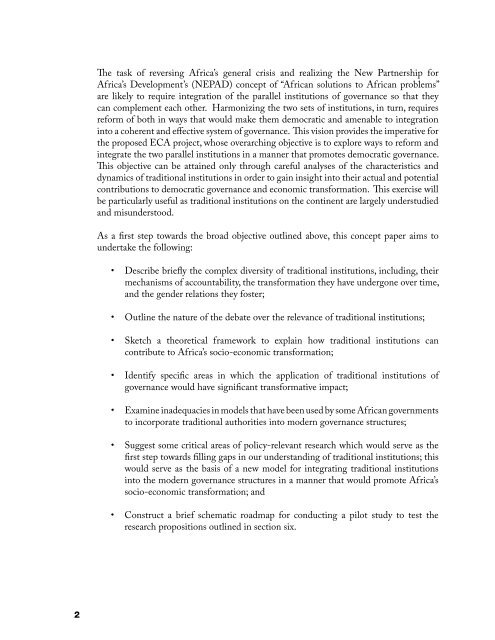Relevance of - United Nations Economic Commission for Africa
Relevance of - United Nations Economic Commission for Africa
Relevance of - United Nations Economic Commission for Africa
You also want an ePaper? Increase the reach of your titles
YUMPU automatically turns print PDFs into web optimized ePapers that Google loves.
The task <strong>of</strong> reversing <strong>Africa</strong>’s general crisis and realizing the New Partnership <strong>for</strong><br />
<strong>Africa</strong>’s Development’s (NEPAD) concept <strong>of</strong> “<strong>Africa</strong>n solutions to <strong>Africa</strong>n problems”<br />
are likely to require integration <strong>of</strong> the parallel institutions <strong>of</strong> governance so that they<br />
can complement each other. Harmonizing the two sets <strong>of</strong> institutions, in turn, requires<br />
re<strong>for</strong>m <strong>of</strong> both in ways that would make them democratic and amenable to integration<br />
into a coherent and effective system <strong>of</strong> governance. This vision provides the imperative <strong>for</strong><br />
the proposed ECA project, whose overarching objective is to explore ways to re<strong>for</strong>m and<br />
integrate the two parallel institutions in a manner that promotes democratic governance.<br />
This objective can be attained only through careful analyses <strong>of</strong> the characteristics and<br />
dynamics <strong>of</strong> traditional institutions in order to gain insight into their actual and potential<br />
contributions to democratic governance and economic trans<strong>for</strong>mation. This exercise will<br />
be particularly useful as traditional institutions on the continent are largely understudied<br />
and misunderstood.<br />
As a first step towards the broad objective outlined above, this concept paper aims to<br />
undertake the following:<br />
• Describe briefly the complex diversity <strong>of</strong> traditional institutions, including, their<br />
mechanisms <strong>of</strong> accountability, the trans<strong>for</strong>mation they have undergone over time,<br />
and the gender relations they foster;<br />
• Outline the nature <strong>of</strong> the debate over the relevance <strong>of</strong> traditional institutions;<br />
• Sketch a theoretical framework to explain how traditional institutions can<br />
contribute to <strong>Africa</strong>’s socio-economic trans<strong>for</strong>mation;<br />
• Identify specific areas in which the application <strong>of</strong> traditional institutions <strong>of</strong><br />
governance would have significant trans<strong>for</strong>mative impact;<br />
• Examine inadequacies in models that have been used by some <strong>Africa</strong>n governments<br />
to incorporate traditional authorities into modern governance structures;<br />
• Suggest some critical areas <strong>of</strong> policy-relevant research which would serve as the<br />
first step towards filling gaps in our understanding <strong>of</strong> traditional institutions; this<br />
would serve as the basis <strong>of</strong> a new model <strong>for</strong> integrating traditional institutions<br />
into the modern governance structures in a manner that would promote <strong>Africa</strong>’s<br />
socio-economic trans<strong>for</strong>mation; and<br />
• Construct a brief schematic roadmap <strong>for</strong> conducting a pilot study to test the<br />
research propositions outlined in section six.
















